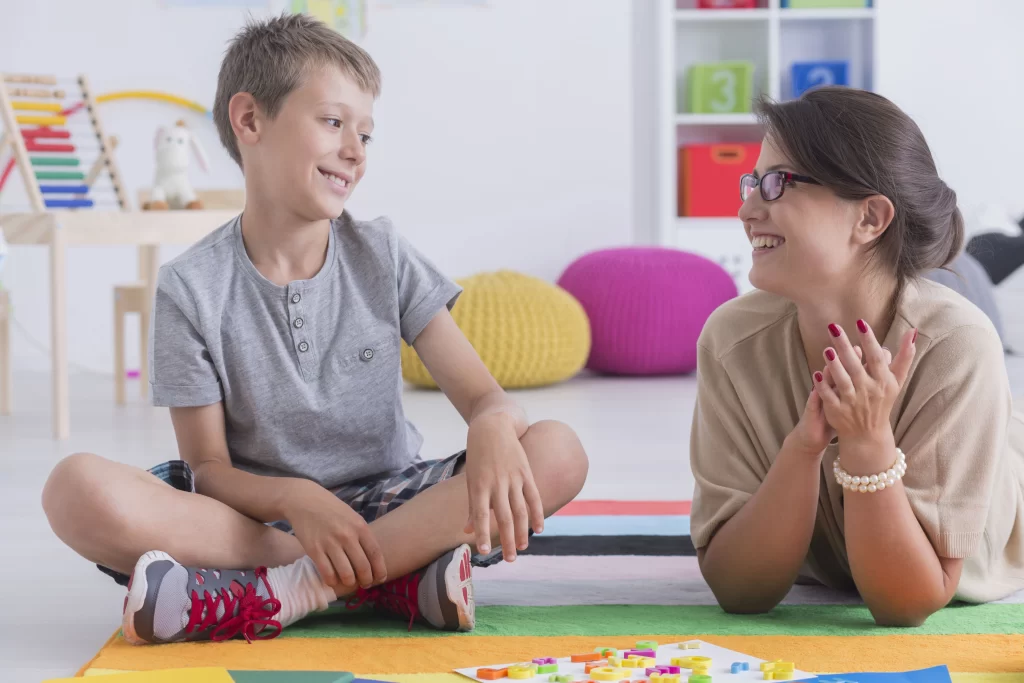Positive Behaviour Support Meaning
Positive Behaviour Support aims to understand individuals who display behaviours that challenge. Additionally, this approach provides positive behaviour support strategies to individuals and helps them develop new skills to improve their quality of life.
PBS focuses on reducing behaviour that challenges through tailored behaviour support plans and is involved in creating supportive environments where an individual is understood and provided with alternative behaviours that benefit them. Therefore, PBS focuses on understanding the factors contributing to challenging behaviours.
Positive behaviour support aims to reduce the use of restrictive practices by focusing on proactive strategies that address the underlying causes of challenging behaviour. This approach emphasises environmental modifications and teaching alternative skills to replace problem behaviours. This approach produces positive change and results for individuals with a learning disability, autism, or challenging behaviour. To understand this approach better, it’s important to get an overview of the core principles of PBS.
![]()
Principles of Positive Behaviour Support PBS
Positive Behavior Support is a strength-based approach consisting of many key elements, outlining strategies that address challenging behaviours to create a supportive environment. PBS is built upon the understanding that behaviours that challenge serve a purpose for the individual experiencing the certain behaviour.
Therefore, a few key principles of Positive Behaviour Support focus on creating a positive and inclusive environment that helps understand the individual and provide them with the required support.
Person-Centred Approach
PBS supports the concept of care that individuals should be at the centre of their own support. This means that individuals experiencing challenging behaviours should be involved as much as possible in planning and implementing their support strategies. Additionally, Applied Behaviour Analysis (ABA) is often used to develop behaviour support plans in the context of a person-centred approach.
The person-centred approach underlines the importance of respecting one’s dignity and autonomy. Additionally, this helps identify the individual’s strengths and abilities and areas for skill development, which professionals can later help enhance. The individual’s family members receiving support can also be involved in the PBS planning.
This approach allows the strategies and behaviour support plan to be tailored to the individual’s needs, which leads to positive outcomes.
Positive Reinforcement
Positive performance is at the core of PBS, which involves providing positive consequences for a specific behaviour that increase the likelihood of that behaviour being repeated in the future.
It’s crucial to remember that PBS, with its proactive approach, focuses on building and developing skills instead of punishing individuals for behaviours that challenge them. Moreover, PBS believes that negative reinforcement increases challenging behaviour and does not improve an individual’s quality of life.
Therefore, positive reinforcement can be a powerful tool to help individuals learn new patterns and ways to communicate their needs while eliminating challenging behaviour. Lastly, when professionals use positive reinforcement during their time together, individuals are more likely to feel empowered to engage in positive behaviour and develop their skills.
Partnership and Teamwork
The strength and nature of the relationship between the support workers and the individual requiring support are crucial. Although support workers and carers should always strive to establish a professional interpersonal connection, it’s crucial for the individual requiring support to see the carer as a friend. This builds trust, comfort, and rapport that can later benefit the person’s behaviour and overall support.
Building this relationship can also help identify specific behaviours, likes, dislikes, potential risks and triggers, which will later benefit the proactive strategies of Positive Behaviour Support.

Assessment-Based Intervention
Assessment-based intervention is a crucial principle of Positive Behaviour Support and one of the main reasons the approach is practical.
Assessing and data collection on an individual’s behaviours that challenge helps PBS professionals to:
- Understand the reason and the unmet need for a specific challenging behaviour
- Develop and implement strategies for a Positive Behaviour Support plan
- Gain insight into the progress of the support plan
Hence, involving family members and the individuals requiring support is essential while developing a PBS plan.
Being Preventative, Not Just Reactive
Positive Behaviour Support uses proactive strategies to eliminate or minimise behaviours that challenge from occurring. Additionally, these strategies build supportive environments that promote positive behaviours.
Proactive strategies can include:
- Environmental modifications
- Supportive relationships
- Providing opportunities for choice
- Positive reinforcement
- Building new skills or leveraging on existing ones
- Structured routines
Outcome Based Approach
Positive Behaviour Support is an outcome-based approach, which means that PBS strategies are developed to achieve specific goals or outcomes. This might include:
- Minimising or eliminating challenging behaviour
- Providing healthy alternatives to meet needs
- Enhancing positive social interactions
- Positive reinforcement
- Improving the general quality of life
The outcome of Positive Behaviour Support is measured by the person’s behaviour over time. Therefore, PBS focuses not solely on the process of implementing PBS strategies but on the actual outcomes achieved by those interventions. It is crucial to remember that this approach underlines the importance of measuring progress and making adjustments based on the individual’s needs.

![]()
How Leaf Complex Care is Applying the Principles of PBS
Leaf Complex Care supports individuals and provides person-centred care rooted in PBS principles. We understand the value of Positive Behaviour Support and firmly believe in its power to make a difference in people’s quality of life.
Our support workers are trained in PRO-ACT SCIPr, a ‘whole approach’ to supporting individuals with or at risk of experiencing challenging behaviours. This approach underlines proactive strategies to minimise the need for reactive strategies.
To see how we can work together and bring you closer to the support we are involved in, please watch what the families of the individuals we support have to say:
To learn more about Richard’s story and care journey with Leaf Complex Care, please click here.
We provide CQC-regulated care in Bristol, Slough, Somerset and the Midlands.
If you want to learn more about Positive Behaviour Support or discover how we can help you, please get in touch with our team.


















